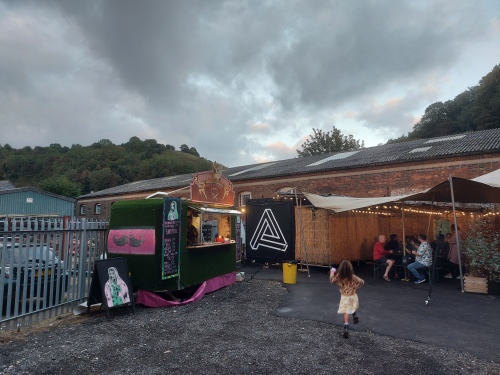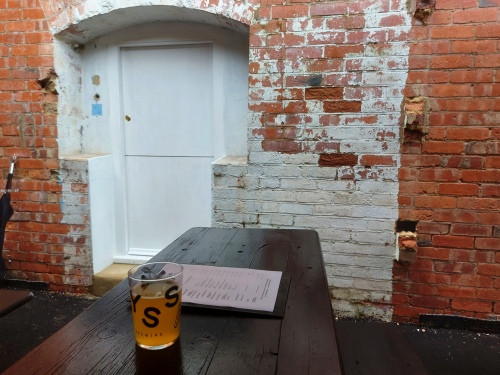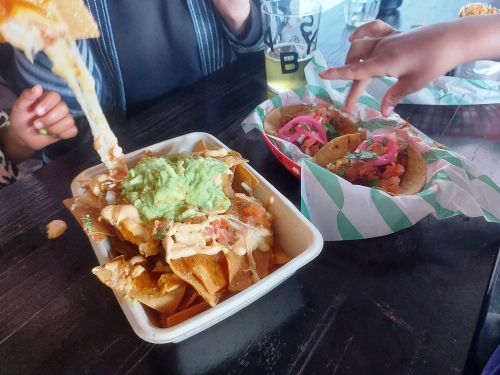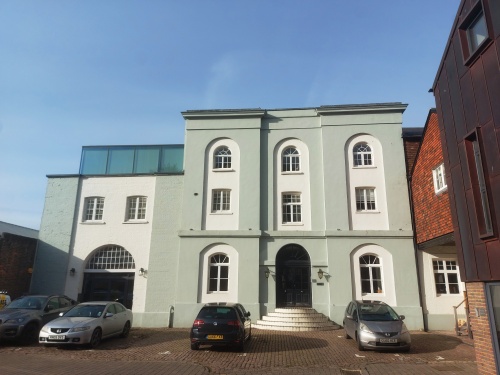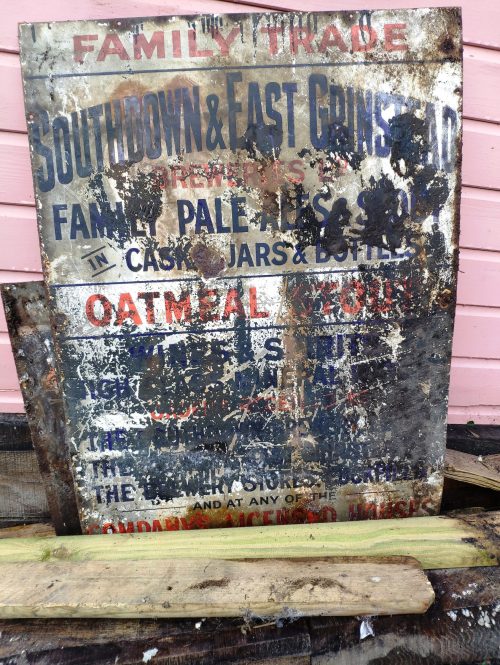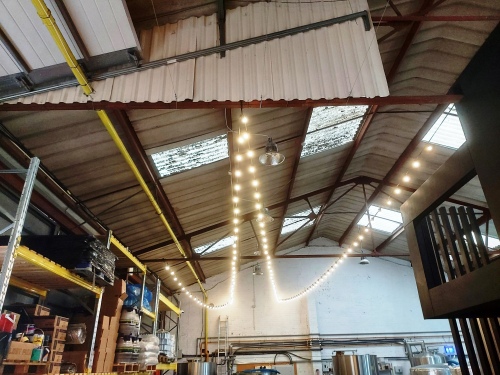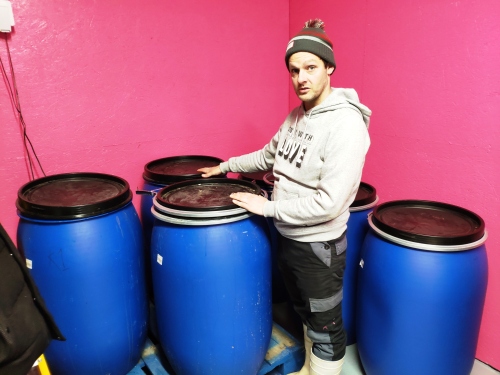If you like British pubs, you’ll be fully aware of the tragic rate they are closing, unable to afford the running costs and compete with cheap supermarket booze even before Covid made things even harder. So it’s always great when somewhere new – somewhere new and selling excellent beer – opens up. Especially if it’s in your neighbourhood. Especially if it’s in your neighbourhood, which historically had plentiful pubs and breweries.
Such is the case for me with Abyss Brewery + Tap, which is not only a ten minute walk from my house, but is also bringing life back to part of Lewes, East Sussex, which has a strong brewing heritage. Indeed, it’s a great example of small town English industry coming full circle. As such, this blog post is hyperlocal, but it’s also about a situation that potentially has echoes across the rest of the country.
Abyss is located in a commercial estate in the South Malling area of Lewes. Along with the Cliffe area, South Malling was historically a separate borough to Lewes itself, over the river Ouse. These days it’s all one authority, but as South Malling is my neighbourhood, and I’ve long wondered why we don’t have any pubs here, in this post I thought I’d concentrate on the beer history of Cliffe and notably South Malling.
Covid Crowdfund
Abyss itself did start over the river, in the cellar of the Pelham Arms pub at the top of town. Andrew Mellor, who is the co-founder of Abyss with his old friend Andy Bridge, leases the pub, and back in 2016 they started brewing there. This is remarkable given that the pub is tied to traditional Dorset brewer Hall & Woodhouse. Briefly, their brews proved popular, so they expanded the old Black Cat brewery at Palehouse Common, near Uckfield in the Weald. Then, in late 2020, they stated a Crowdfunder, and within two months had raised £30,000 to enable them to move into their current site – formerly the malthouse or malt store of Southdown Brewery. Clearly people were crying out for more decent beer, more Abyss. I do wonder how much of that crowdfunding came from locals like myself crying out for a local.
Although their renovation and installation work was slowed down due to Brexit and Covid-related supply chain issues, they were able to open in summer 2021. Prior to that, I’d enjoyed their brews in the Pelham, and more recently had their fresh draft delivered during the lockdowns and Covid restrictions of the 2020 and 2021. Finally being able to go to the taproom was great, especially as not only do their have great beers, but there’s also Mexican streetfood care of Carlito Burrito, who has a restaurant in Brighton. It’s a wonderful revitalisation of the area, though a very different beer experience to what would have happened here in the Southdown days!
Days of yore
Harvey’s is the only historic brewery in Lewes (indeed, in Cliffe) to survive, but there were many others*. Harvey’s has the John Harvey Tarvern in Bear Yard, and the Bear Yard Brewery operated there in the 1700s. In 1817 it was sold to Thomas Wood and Thomas Tamplin. Tamplin was younger brother of Richard, who founded Tamplin & Sons in Brighton in 1821. Tamplins became a huge operation for its time, though it was itself bought by London-based Watney, Combe & Reid in 1953, before brewing ceased at its Brighton Phoenix facilities in 1973. (Watneys didn’t last much longer: 1979. But I digress. Even further.)
John Harvey was a wine importer who brewed at Bear Brewery by arrangement with Wood. When Wood died in 1838, his sons Alfred and George Wood took over, before they in turn were replaced by their brother-in-law Edward Monk in the late 1850s. The operation itself became known as Edward Monk & Sons. Meanwhile, Harvey bought the nearby Bridge Wharf site in 1838 and although the story was troubled, with various family members dying young, in 1881, their fantastic Victorian gothic new premises were built – which is where they brew to this day.
Meanwhile, Southdown Brewery had been established in 1838 by Alfred Hillman and Thomas Street. I believe the nearby Thomas Street is named after him. Surely convention should have dictated it was named Street Street? Anyway, at the end of this street is a building with a fine Victorian neoclassical facade. This was formerly Southdown’s “counting house”, its offices, and is now a Grade II listed building. This grandeur indicates Southdown fared well, though an employee, William Gresham-Wiles, died in 1863 from falling into a tun.
Southdown was bought in 1895 by Augustus and Thomas Manning. Their expansion included buying the Hope Brewery in East Grinstead (founded in 1844). Thus it became Southdown & East Grinstead Breweries Ltd. Southdown & East Grinstead also bought Monk & Sons in 1898. Just to continue with the dangers of brewing, in 1900, another employee, Herbert Bunce of Lewes, was squashed by a brewery traction engine, used for carting beer, while loading from the Southdown & East Grinstead stores in Cuckfield. (The full story is here.)
Fire and direliction
A few winters ago, I helped a friend demolishing a collapsing shed on his allotment in the Coombe, a fabulous valley in Wildlife Trust land to the east of Lewes. I was thrilled to find this sign. Love the idea of “Family pale ales and stout.”
Southdown & East Grinstead had 93 tied houses (pubs) by the time it was sold to Tamplins in 1924. The buildings were bought by agricultural machinery firm Culverwells in the 1940s, who then sold up in 2005. The maltings and other brewing buildings on Davey’s Lane fell into partial dereliction. In the 20-tens (or whatever we call that decade), some were converted into overpriced flats – “the Old Brewery Apartments”, which at least saved the buildings, a wonderful piece of our industrial heritage, from demolition**. There’s a photo gallery of the building’s previous state (with even more ranty blog post than mine) dated 2015 here.
Tamplins was also the destiny of the fourth brewery operating in Cliffe and South Malling in the 19th century. South Malling Brewery was built in 1821 by Alexander Elmsley on Malling Street, then an important commercial and residential road, now largely treated as a bypass by the authorities, with constant speeding traffic. In 1866, it burned down. This seems to be a fairly consistent theme – brewing involved a lot of heating, and that heat in the 19th century was provided by burning stuff (latterly, more efficient but still risky coal-burning steam engines). There’s a reason Tamplins’ brewery in Brighton was called the Phoenix – Richard Tamplin had bought the nearby Southwick Brewery in 1820, only to see the (thatched) building burn down. Hence the name of his replacement buildings in Brighton.
Anyway, Elmsley’s brewery was rebuilt, becoming South Malling Steam Brewery. Old photos show another handsome Victorian industrial building, where Elmsley operated as not just a brewer but also a wine and cider merchant, maltster and agent for other breweries before he died in 1875. Malling Steam Brewery became part of the Tamplins empire in 1899. The brewery itself became the County Town mineral works, making mineral water, before it too burned down in the 1960s.
Trends, and bucking them
Adajacent to the brewery building was a pub at number 123 Malling Street, once known as the Wheatsheaf, then finally Cleo’s nightclub, which closed in 1976. I believe this had been tied to both the South Malling Brewery and another local brewery, Beard & Co, but is also long gone, simply leaving its name to a modern residential development, the adjacent Wheatsheaf Gardens, gateway to the abovemention Coombe.
Similarly long gone is the Tanners Arms, later Elmsley’s Brewery Tap, at 135 Malling Street. Any of these boozers could have been my locals if they’d survived, as I live just up the road. Meanwhile, in Cliffe, were the Hare & Hounds (38-40 Malling Street) and Foresters (aka Rose & Crown, 30 Malling Street), while further up Malling Street at number 63 was the Rock Inn, and then at number 163, closer still to my house, was the Prince of Wales, which closed in the early 1990s.
Aside from a bar in part of what is now the community centre and children’s centre, the closure of the Prince of Wales then a few years ago the working men’s club, left South Malling – developed since the 1950s into a substantial residential area – without a boozer until the opening of Abyss. So thank you Andrew and Andy.
There may be a tragic trend of pubs closing in England, but thankfully here in Lewes, we have new craft beer bars (like The Patch), breweries (like Beak) and taprooms opening at a wonderfully trend-bucking rate. Many of these places, opening in industrial buildings, have something traditional pubs can’t always offer – space, which has proved invaluable during Covid restrictions. The stories of pubs closing are sad, a great loss to our traditional culture, but are we also seeing a transition? After years of the brewing trade being dominated by massive multinationals, we seem to be seeing a return to the local, which makes sense on many levels, not least because it’s madness to expend energy shipping a product that’s basically water (transformed by skill and fungus) all around the world.
The story of all these breweries indicates how local booze consumption once was, and now we’re seeing a revival of this taste for the local, and shunning of the generic beers of the multinationals. I hope it’s a trend that continues across the country, as it’s great for local trade and great for the consumer.
* I’m not talking about the ones over the river in Lewes itself, but they included Ballard & Co, Bell Lane, Southover; Verrall & Sons, Southover High Street; Castle Brewery/ Langford, Castle Gate. The Maltings (built 1854-56) of the latter, later sold to the nearby Beards, is extant, on Castle Precincts, just round the corner from the Lewes Arms. I was lucky enough to get a look at the malt kilns in the back a few years ago, but of course I can’t find my photos now. They were pretty gloomy.
** I believe architects and developers are increasingly realising that the more sustainable option for housing and building generally is to re-purpose existing buildings instead of expending vast amounts of energy on demolition and pouring more concrete (as cement is such an environmentally costly material). As this thinking progresses, hopefully it’ll mean saving more of our architectural heritage.
Bibliographical note & acknowledgements
As well as various online resources, for this piece I’ve also drawn from various local history books. These include:
The Chronicles of Cliffe & South Malling 688-2003AD by Brigid Chapman
Lewes Through Time by Bob Cairns
Lost Lewes by Kim Clark
I love local history books like these, with text descriptions and photographic records of how things once were, so thanks and acknowledgements to all, if any of the writers ever happen up my blog.
The book I still need is The Inns of Lewes, Past & Present by LS Davey. When I get that, I may have to update some things here. Or if anyone wants to correct inaccuracies, please do!

